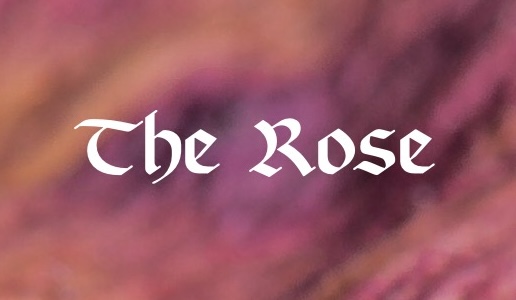Electric Literature is pleased to reveal the cover of The Rose by Ariana Reines, a poetry collection which will be published by Graywolf Press on April 15th 2025. You can pre-order your copy here.
In The Rose, award-winning poet Ariana Reines explores the intersection of rage and surrender. Drawing on the lineage of medieval troubadours’ erotic poetry, Reines employs the feminine, sexual symbology of the titular flower to also explore masculine pain: “I loved to hurt, be hurt by him. / There was a locked & secret mansion in him that I loved.” In these poems, inherited ideologies of femininity and masculinity are replaced with bold vulnerability, and the overturning of gender dynamics transforms the speaker’s understanding of suffering, desire, and transmutation. The voice in The Rose is wry and bare, dealing honestly with the connection between erotic love and spirituality. Reines approaches these themes with humor: “I want to vomit, die, and change my life in that exact order.” Investigating war, maternity, violence and sensuality, and the role of writing in magical acts, Reines is unafraid to write “the horrible / And Freudian thing” that “might ruin this poem,” and the result is a bloody and pulsing, sexy and unabashed bloom.
Here is the cover, designed by Jeff Clark.
Designer Jeff Clark: “For the first round of designs I did for the cover of The Rose, I mainly worked with an image, supplied by Ariana, of a 15th-century aquamanile (vessel for pouring water) in the form of Aristotle, on all fours, being ridden by Phyllis, whose right hand is clutching his hair and whose left hand is slapping his bottom. According to The Met, Aristotle, Alexander the Great’s tutor, ‘allowed himself to be humiliated by the seductive Phyllis as a lesson to the young ruler, who had succumbed to her wiles and neglected the affairs of state.’ I dug how the aquamanile referenced both the alleged pleasures/costs of seduction as well as the book’s Venus Williams epigraph, ‘Discipline is freedom’—Phyllis is free and Aristotle’s saddled. From one design standpoint, a ribald aquamanile and not a rose, I was thinking, would be a shrewd signal that this book is about ecstasy and its denial rather than about dead-natured, hyperpoeticized flora.
But in resonance with something Ariana writes at the outset—’I could feel him hesitating to finish a compliment I wanted to receive in words, an energy I wanted to force him to force through language. You are going to give me this compliment directly, I said.’—I also produced some cover concepts that featured roses. Cover designs that illustrate a title or core emblem of a book head on can be just as alluring as their alternatives, which maybe has something to do with the erotic nature of transparency?
The cover design that Ariana and the press chose uses a detail from a macro photograph of a petal of a rose that’s just beginning to wilt. A little death, a little life. Ariana and I worked together to manipulate the colors of the photograph, and the type I arrived at is a ‘fraktur’ face—there’s a little bit of splitting/cleavage where the thin end of a stroke meets the thick width of an adjacent stroke. Finally, the arrangement of the type has to do with rising’s antithesis: ‘Which fell one day and never rose / Again . . .’”
Author Ariana Reines: “I fell in love with this cover immediately—it’s like a portal. Jolie-laide. The more I look at it the more I see. The more it gives. And of course it’s also giving a lot: it’s giving gonad, wrinkled cheek, a genuinely fresh perspective on beauty and beauty’s many ancient tropes. What could be more overdetermined and more loaded with cliché than a rose?
The minute I laid eyes on it Jeff Clark’s genius cover shone at me as the visual distillation of a profoundly deep and knowing read of my book. I felt he also—so wittily and succinctly—linked The Rose visually to my own cover designs for Coeur de Lion (Mal-O-Mar and Fence), an earlier book that takes up medieval themes of love. One of the fascinations behind The Rose is the birth of—and the loss of—magic; the place of danger in any true magical act.
The Rose is also haunted by the notion of the erotic mistake—the idea a sorcerer can lose their power by misplacing their affections. According to several medieval tellings, Merlin’s mother was a virgin and his father was a demon; Merlin ‘lost’ his power (and Camelot declined) when Morgan le Fay, or Nimue, enchanted him away from court.
But if The Rose has a tutelary spirit, it’s probably Medea, the infamous sorceress of Colchis, whose power and rage have been so occulted the culture is still just beginning to understand her. What if sex is never safe? I feel like Jeff saw right into the soul of my book—the desire to level with and show love in an honest way: repulsive and beautiful, and, like a Vanitas painting—charged with awe in the face of death and decay and the infinite power of Nature.”
Read the original article here

